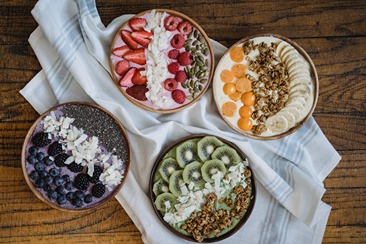Photo by Nicola Barts /pexels
Incorporating the right essential staple foods into your diet can make healthy eating much simpler and more convenient. These versatile ingredients—like whole grains, lean proteins, and fresh vegetables—help you prepare nutritious meals quickly, ensuring that you stay on track with your health goals throughout the week. By having these staples on hand, you’ll always be ready to create balanced, delicious dishes without the stress of daily meal planning.
Whole Grains
Whole grains are a must for any healthy kitchen. They’re rich in fiber, vitamins, and minerals, and they provide long-lasting energy. Staples like quinoa, brown rice, whole grain pasta, and oats are perfect for any meal. Whether you’re making a hearty breakfast porridge or a side dish for dinner, whole grains are a versatile base for nutrient-packed meals.
Lean Proteins
To maintain a balanced diet, protein is essential. Lean protein options like chicken breast, tofu, eggs, and lentils offer the necessary amino acids to keep you full and help with muscle repair. Plus, these foods are easy to prep in batches for use throughout the week. For example, roasted chicken breast can be added to salads, wraps, or stir-fries.
Fresh and Frozen Vegetables
Vegetables are the cornerstone of healthy eating. Spinach, broccoli, carrots, and bell peppers provide essential vitamins, fiber, and antioxidants. Fresh veggies are great, but frozen varieties are just as nutritious and more convenient, lasting longer without losing their health benefits. Keep a mix of both to ensure you can whip up a healthy side dish or stir-fry anytime.
Healthy Fats
Don’t shy away from healthy fats! Avocados, olive oil, nuts, and seeds are essential for heart health and help keep you satisfied between meals. These fats are easy to add to salads, smoothies, or even as cooking oils. Incorporating them into your meals helps balance macronutrients, making for more complete and filling dishes.
Canned Goods
Stocking up on canned foods like beans, tomatoes, and tuna makes meal prep even easier. Canned beans are a great source of plant-based protein and can be thrown into salads or soups. Canned tomatoes serve as a base for sauces and stews, while tuna adds lean protein to sandwiches and salads.
Fruits (Fresh and Frozen)
Fruits are a sweet way to ensure you’re getting vital nutrients. Berries, apples, bananas, and citrus fruits are easy to grab for snacks or toss into smoothies. Like vegetables, having frozen fruit on hand means you can enjoy out-of-season favorites year-round, adding them to smoothies or yogurt bowls.
Dairy or Dairy Alternatives
For calcium, vitamin D, and protein, keep yogurt, milk, or dairy alternatives like almond milk in your fridge. These can be used in smoothies, as a base for overnight oats, or enjoyed on their own. Choose low-fat or unsweetened varieties to keep your meals as healthy as possible.
Conclusion
With these staple foods, you can make healthy eating easy all week long. By having these ingredients on hand, you’ll be able to create quick, nutritious meals without much hassle. Eating well doesn’t need to be complicated – just plan ahead, and you’ll be ready to tackle the week with balanced, delicious meals.
For more detailed tips and insights, check out this comprehensive guide from Healthline.
Similar FAQ
What are the best grains to include in a healthy diet
Whole grains like quinoa, brown rice, and oats are rich in fiber and essential nutrients.
Can I use frozen vegetables instead of fresh ones
Yes, frozen vegetables are just as nutritious as fresh and are great for long-term storage.
What are some healthy snacks using staple foods
Nuts, seeds, fruits, and yogurt make for quick and nutritious snacks.
How can I incorporate lean proteins into my meals
Use chicken, eggs, or plant-based proteins like tofu or lentils to bulk up salads, stir-fries, and wraps.
Why are healthy fats important in a balanced diet
Healthy fats like those in avocados and olive oil help you stay full and support heart health.

